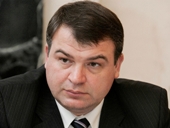Russia plans sweeping military reforms
 Moscow - Its organization unchanged since 1945, Russia's military now faces an overhaul, after its brief war with Georgia this summer showed leaders the country needs a more agile force that does not operate on Cold War scenarios.
Moscow - Its organization unchanged since 1945, Russia's military now faces an overhaul, after its brief war with Georgia this summer showed leaders the country needs a more agile force that does not operate on Cold War scenarios.
While reforms were in the works before the Georgia war, the sight last August of Soviet-made tanks stalling as they pushed into South Ossetia and instances of military officers forced to use journalists' satellite phones to communicate with command muddied Russia's victory.
The campaign not only exposed the army's outdated weapons, poor reconnaissance abilities and lack of precision missiles, but also the need for deeper, structural changes in the face of modern conflicts and insurgency threats.
Russia's military brass are all willing to admit these weaknesses. But military experts say an obsession with secrecy has muddled the main thrust of the reforms and may undermine them.
The army reform meeting was held behind closed doors last week and followed by a guarded release of some of the details by Russia's Defence Minister Anatoly Serdyukov - a former tax expert with no ties to the military who was elevated to his post by former President, now Prime Minister, Vladimir Putin.
But the proposed reforms are being conducted with little input from the military. Without that debate, or consultation with the military, there is an ever-growing chance of opposition from generals who stand to lose their jobs. It also leaves much room for criticism from experts.
Foremost among those critiques: it is unclear what enemy the Russian army is preparing to face.
Huge war games last month, dubbed Stability 2008, showed Russia's readiness for a full mobilization that appeared aimed at rebuffing a US-led attack by NATO forces on Russia's southern border with Georgia.
The exercise -the largest since a decade before the Soviet collapse - involved tens of thousands of troops and armoured vehicles and scores of air and navy craft. It culminated in the launch of three nuclear-capable intercontinental ballistic missiles.
"The games were the logical preparation for war with America if the war with Georgia were to escalate ... the end game," Moscow-based military analysts Pavel Felgenhauer said in an interview with Deutsche Presse-Agentur dpa.
Serdyukov's reforms would shift the military's focus away from that end game of full-out wars to new threats, such as terrorist attacks and insurgencies.
One radical move is to scrap lumbering divisions or corps headquarters in favour of Western-style army brigades, which are self-contained, battle-ready units that are more agile and rapidly deployed.
The Russian military crumbled to Third World standards with the end of the Cold War. Its manpower fell 4 million to 1.1 million while budgets were slashed.
But the army retained a top-heavy structure intended to manage the swell that would be necessary with a national mobilization.
"Our army is today like an egg - swollen in the middle. We have more colonels and lieutenant colonels than junior officers," said Serdyukov, quoted by the Interfax news agency.
He proposes halving the senior officer corps, which now makes up about 30 per cent of the army, and increasing the number of junior, mid-tier officer who generally command attacks. He would want the changes in effect by 2012.
Streamlining the army chain of command, however, also means retiring a swath of generals who would expect free, but hard to provide, apartments and other forms of compensation.
If the reforms pull through, it would add military might to Moscow's political pressure on its former Soviet republics, an increasing worry of the West after Russia's occupation of parts of Georgia.
All told, the biggest road block to a Russian military renaissance may be the current financial crisis, which has shredded oil prices that were previously packing Russia's coffers.
Russian President Dmitry Medvedev announced in September a 25 per cent hike in defence spending to 50 billion dollars in 2009 and an additional 4 billion dollars each year until 2012. But that extra funding may now very well be diverted to shore up the financial sector. (dpa)